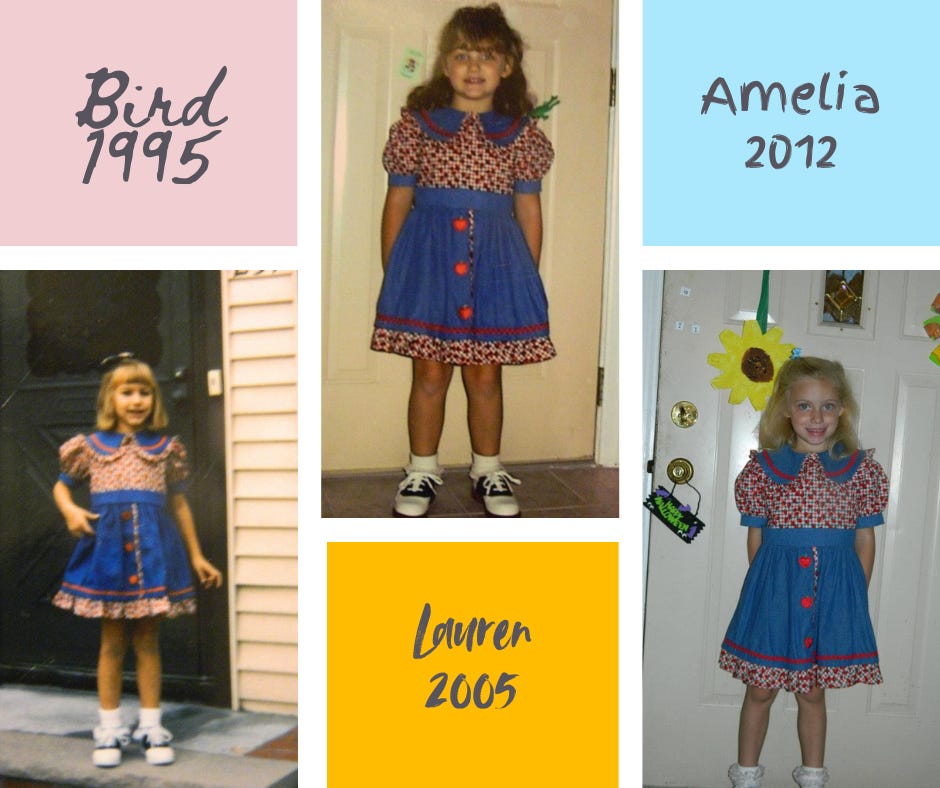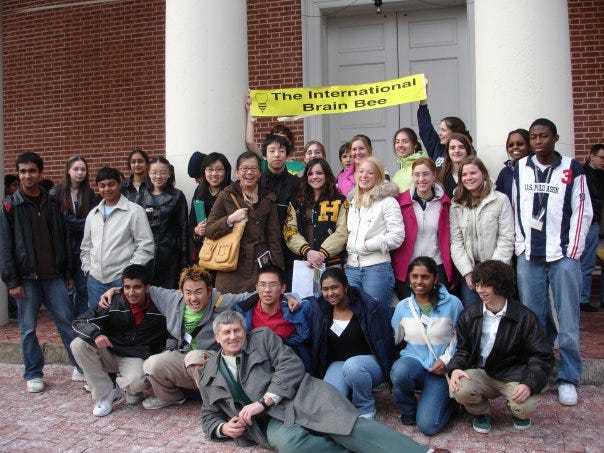Back To School With Bird, Pt. 1
This Week's Lesson: A Primer On Neurodiversity & Neurodivergence
Dear Friends,
Have I told you all how much I love Back to School season?
I’m a few years out from my own last (for now) BTS – I finished my last semester of grad school in Fall of 2015, but my wife has had plenty more since we married the following year. And last week she went back to school for what, at this point, feels like the umpteenth time, but is at the same time almost the end. This is very nearly the end of her coursework as she prepares to become a veterinarian, with mostly clinical preparation ahead of her. There have been about two years in our lives 16 knowing each other when no one was in school, but we’re getting there.
I have always been a fresh notebooks and pens, school shoes and cardigans kind of person. I resented the warm early Septembers that made khakis and sweaters a bit untenable. I want crisp fall mornings, the sort when apple print dresses feel remarkably in season (the things I put my mother through in the name of apple print back to school dresses for my little sisters!).

I am grateful for the small normalcies of back to school, even when school is the later years of a terminal, professional degree for my spouse, and also grateful for switching to my new September planner, for meal prep and routines, for writing schedules and organizing my classrooms.
But why am I going on about Back to School?
Well, I’m thinking about the things we all have to learn as part of being a community. I’m thinking about how we learn and about our efforts to do our best. I’m thinking about jargon and confusion and earnestness and building competency. I’m thinking about disability, and specifically about neurodivergence. And because the work of the Church is the work of radical inclusion, of extending the table, we need to talk.
Neuro-what? A Language Primer
To begin, I want to say that if you are trying to understand the children and adults in your family or community who are autistic, who have ADHD or down syndrome, who live with mental illness, who have experienced brain re-shaping emotional trauma or physical brain injuries, who have epilepsy or tics – thank you.
And for those of you who live with these conditions and experiences, I see you. I’m glad we’re here together.
Now for the work at hand. This week’s post is brought to you by the Facebook posts I get tagged in and rarely fully respond to because they are asking something that is just too big. It usually goes something like this:
We want to do more to support neurodiverse children and youth. What are some good resources to start with?
It’s an important question, right? Well, yes and no. Because there are a few things going on here. Let’s break it down.
As I wrote about for BuildingFaith a few years ago, all of our communities are neurodiverse. Like diversity itself, the concept includes everyone. Just like white people aren’t exempted from the entire concept of diversity, people who are neurotypical – whose brains align with generally accepted norms – are part of our great big world of brains.

When the well-meaning question is “How do I support neurodiverse children?” the question is too imprecise. It is a question about everyone. And it’s not actually the question you mean to ask. So let’s keep going.
If neurodiversity includes everyone, neurodivergence is the word you’re searching for to describe difference. To be neurodivergent is to have any of dozens of cognitive differences, like those I mentioned above. It is autism and ADHD, yes, but it is also mental illness and seizure disorders, it is down syndrome and migraines, dyslexia and post-concussion syndrome, dementia and synesthesia and this is nowhere near an exhaustive list. And that’s the next part of the problem with the question!
So let’s talk about these special, categorical words. It’s great to know and explore these big concepts, but it’s also important to be specific and say what you mean. So if your question is really, “how do I support the kids in my circle who have ADHD and autism?” then ask that question! It’s not offensive. It’s precise. And if that’s not what you mean, once again, please ask what you really mean – because when people do ask the vague – how do I support neurodiverse or neurodivergent kids – people tend to assume they mean ADHD or autism and those are the answers the question receives, and that’s not fair. Because if the broad question is actually the accurate one, if the asker is in fact blessed to have a circle that includes such a broad array of cognitive experiences, they deserve an answer that acknowledges those differences.
I feel pedantic when I say all of this. If people are asking an imprecise question and getting an answer that does mostly answer the question, does it really matter?
I would argue that it does, and not just because I was once a PhD student specializing in disability studies and I have always been kind of pedantic. My childhood classmates called me a walking dictionary for the way I spouted definitions (shocker, it was the autism all along).
No, it matters for multiple reasons. It matters because we need to ensure that we really are extending a seat at the table to everyone. It matters because niche language like neurodivergent creates a community of alliance, a place for those of us who are used to feeling othered to gather in support. And honestly, the people who get left out of the term in those inaccuracies are generally those who are most marginalized.
I’m not saying that it’s easy to have ADHD or to be autistic. I’m autistic. My wife has ADHD. We live these things. But realistically, we are both high achieving people. We don’t have co-occurring intellectual disabilities and we’re in touch with reality. We don’t experience hallucinations or serious memory issues.
When people ask an imprecise question about neurodivergence, they are usually talking about children who are mild to moderate behavioral challenges because of their disabilities. They aren’t necessarily looking for information on trauma-informed practices or how to support children and families dealing with a Tourette syndrome diagnosis. And if those things are actually part of the question, then they aren’t being met with the answers they need.
Do you see where I’m going with this? The cycle we’re stuck in?
So, now what?
That answer is going to have to wait until next week. But like so many back-to-school undertakings, we need to lay the foundations.
I’ll leave you with this, because it falls in one of the most common question categories about support and accommodations – should I offer fidgets and what kinds? Fidgets are tools and they have a place in our worship and formation with the same parameters that other kinds of tools have: you use them because you need them and you use them as they are intended to be used. Another week, I’ll tell you what I keep on hand and what I might add or change depending on context.
What question do you really want to ask, but you’re worried it will come out wrong? Make the mistake. The mistake that is first held back by anxiety is one laden with care – but we only move forward by asking.
Peace,
Bird





I like where this is going! I found the book - my body is not a prayer request - turn my thinking around.
I will look forward to reading your next post.